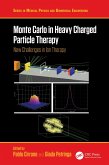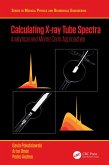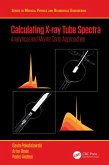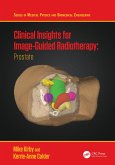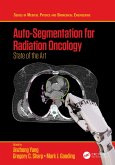Monte Carlo in Heavy Charged Particle Therapy (eBook, ePUB)
New Challenges in Ion Therapy
Redaktion: Cirrone, Pablo; Petringa, Giada
52,95 €
52,95 €
inkl. MwSt.
Sofort per Download lieferbar

26 °P sammeln
52,95 €
Als Download kaufen

52,95 €
inkl. MwSt.
Sofort per Download lieferbar

26 °P sammeln
Jetzt verschenken
Alle Infos zum eBook verschenken
52,95 €
inkl. MwSt.
Sofort per Download lieferbar
Alle Infos zum eBook verschenken

26 °P sammeln
Monte Carlo in Heavy Charged Particle Therapy (eBook, ePUB)
New Challenges in Ion Therapy
Redaktion: Cirrone, Pablo; Petringa, Giada
- Format: ePub
- Merkliste
- Auf die Merkliste
- Bewerten Bewerten
- Teilen
- Produkt teilen
- Produkterinnerung
- Produkterinnerung

Bitte loggen Sie sich zunächst in Ihr Kundenkonto ein oder registrieren Sie sich bei
bücher.de, um das eBook-Abo tolino select nutzen zu können.
Hier können Sie sich einloggen
Hier können Sie sich einloggen
Sie sind bereits eingeloggt. Klicken Sie auf 2. tolino select Abo, um fortzufahren.

Bitte loggen Sie sich zunächst in Ihr Kundenkonto ein oder registrieren Sie sich bei bücher.de, um das eBook-Abo tolino select nutzen zu können.
This book explores the current difficulties and unsolved problems in the field of particle therapy and, after analysing them, discusses how (and if) innovative Monte Carlo approaches can be used to solve them.
- Geräte: eReader
- mit Kopierschutz
- eBook Hilfe
Andere Kunden interessierten sich auch für
![Monte Carlo in Heavy Charged Particle Therapy (eBook, PDF) Monte Carlo in Heavy Charged Particle Therapy (eBook, PDF)]() Monte Carlo in Heavy Charged Particle Therapy (eBook, PDF)52,95 €
Monte Carlo in Heavy Charged Particle Therapy (eBook, PDF)52,95 €![Calculating X-ray Tube Spectra (eBook, ePUB) Calculating X-ray Tube Spectra (eBook, ePUB)]() Gavin PoludniowskiCalculating X-ray Tube Spectra (eBook, ePUB)48,95 €
Gavin PoludniowskiCalculating X-ray Tube Spectra (eBook, ePUB)48,95 €![Particle Therapy Technology for Safe Treatment (eBook, ePUB) Particle Therapy Technology for Safe Treatment (eBook, ePUB)]() Jay FlanzParticle Therapy Technology for Safe Treatment (eBook, ePUB)49,95 €
Jay FlanzParticle Therapy Technology for Safe Treatment (eBook, ePUB)49,95 €![Calculating X-ray Tube Spectra (eBook, PDF) Calculating X-ray Tube Spectra (eBook, PDF)]() Gavin PoludniowskiCalculating X-ray Tube Spectra (eBook, PDF)48,95 €
Gavin PoludniowskiCalculating X-ray Tube Spectra (eBook, PDF)48,95 €![Clinical Insights for Image-Guided Radiotherapy (eBook, ePUB) Clinical Insights for Image-Guided Radiotherapy (eBook, ePUB)]() Mike KirbyClinical Insights for Image-Guided Radiotherapy (eBook, ePUB)103,95 €
Mike KirbyClinical Insights for Image-Guided Radiotherapy (eBook, ePUB)103,95 €![Particle Therapy Technology for Safe Treatment (eBook, PDF) Particle Therapy Technology for Safe Treatment (eBook, PDF)]() Jay FlanzParticle Therapy Technology for Safe Treatment (eBook, PDF)49,95 €
Jay FlanzParticle Therapy Technology for Safe Treatment (eBook, PDF)49,95 €![Auto-Segmentation for Radiation Oncology (eBook, ePUB) Auto-Segmentation for Radiation Oncology (eBook, ePUB)]() Auto-Segmentation for Radiation Oncology (eBook, ePUB)49,95 €
Auto-Segmentation for Radiation Oncology (eBook, ePUB)49,95 €-
-
-
This book explores the current difficulties and unsolved problems in the field of particle therapy and, after analysing them, discusses how (and if) innovative Monte Carlo approaches can be used to solve them.
Dieser Download kann aus rechtlichen Gründen nur mit Rechnungsadresse in A, B, BG, CY, CZ, D, DK, EW, E, FIN, F, GR, HR, H, IRL, I, LT, L, LR, M, NL, PL, P, R, S, SLO, SK ausgeliefert werden.
Produktdetails
- Produktdetails
- Verlag: Taylor & Francis eBooks
- Seitenzahl: 352
- Erscheinungstermin: 26. Januar 2024
- Englisch
- ISBN-13: 9781000987652
- Artikelnr.: 69593865
- Verlag: Taylor & Francis eBooks
- Seitenzahl: 352
- Erscheinungstermin: 26. Januar 2024
- Englisch
- ISBN-13: 9781000987652
- Artikelnr.: 69593865
- Herstellerkennzeichnung Die Herstellerinformationen sind derzeit nicht verfügbar.
Pablo Cirrone is a medical physicist and researcher at the Laboratori Nazionali del Sud of INFN, Italy, where he supports and coordinates various experimental groups. Dr. Cirrone is an expert in the use of proton and ion in radiation treatment and of absolute and relative dosimetry in electron, photon and ion beam. He is an expert in the development and test of detectors for medical applications, of the production and use of laser-driven beams for medical and multidisciplinary applications and recipient of the Michael Gotein Award. He is active on many scientific committees and organizes national and international conferences. Giada Petringa is a researcher at the Laboratori Nazionali del Sud of INFN, Italy. Dr. Petringa has a professional experience in the field of Monte Carlo simulations for medical applications, dosimetry, microdosimetry, and diagnostics with conventional and laser-driven proton beams. In 2019 she had a MSCA-IF-2019 (Marie Sklodowska-Curie Actions-Individual Fellowship) grant funded by the European Community in the framework of the H2020 program. She is a member of the Editorial Board of the international journal Physica Medica - European Journal of Medical. She organized more than fifteen international Geant4 Schools. She is an official member of the Geant4 code Collaboration at CERN since 2019. She is a code developer, and she collaborates to maintain two of the official examples of the code.
Chapter 1: The Monte Carlo Method and Its Applications to Heavily Charged
Particle Therapy. Chapter 2: Applications of Monte Carlo Calculations in
Clinical Dosimetry of Proton and Ion Beams. Chapter 3: Solving Range
Uncertainties with Gamma Prompt/Charged Particle Prompt. Chapter 4:
Macroscopic and microscopic calculation approaches for LET calculations.
Chapter 5: Low energy inelastic process in hadrontherapy. Chapter 6:
Experimental Data of Nuclear Fragmentation for Validating Monte Carlo
Modes: Present Availability and Lacks. Chapter 7: Quality assurance in
particle therapy with PET. Chapter 8: Radioactive beams for ion therapy:
Monte Carlo simulations and experimental verifications. Chapter 9: Monte
Carlo and Microdosimetry in particle radiotherapy. Chapter 10: Monte Carlo
to link RBE with radiation quality quantities. Chapter 11: Physical and
Biological Impact of Projectile and Target Fragmentation. Chapter 12: Monte
Carlo characterisation of nanoparticle radio-enhancement for hadron
therapy. Chapter 13: Increasing particle therapy biological effectiveness
by nuclear reaction-driven binary strategies. Chapter 14: Monte Carlo
simulations for Targeted Alpha Therapy. Chapter 15: Experimental and
modelling challenges in FLASH radiotherapy with Monte Carlo Methods.
Chapter 16: Towards Multiple Ion Applications in Particle Therapy. Chapter
17: Monte Carlo for chemistry in radiation biology. Chapter 18: Recent
developments in the TRAX particle track structure code. Chapter 19: Machine
Learning for Monte Carlo Simulations. Chapter 20: Speed-up MC in charged
particle applications. Chapter 21: Monte Carlo and Analytical codes for
Dose planning and recalculation: limits and differential advantages.
Particle Therapy. Chapter 2: Applications of Monte Carlo Calculations in
Clinical Dosimetry of Proton and Ion Beams. Chapter 3: Solving Range
Uncertainties with Gamma Prompt/Charged Particle Prompt. Chapter 4:
Macroscopic and microscopic calculation approaches for LET calculations.
Chapter 5: Low energy inelastic process in hadrontherapy. Chapter 6:
Experimental Data of Nuclear Fragmentation for Validating Monte Carlo
Modes: Present Availability and Lacks. Chapter 7: Quality assurance in
particle therapy with PET. Chapter 8: Radioactive beams for ion therapy:
Monte Carlo simulations and experimental verifications. Chapter 9: Monte
Carlo and Microdosimetry in particle radiotherapy. Chapter 10: Monte Carlo
to link RBE with radiation quality quantities. Chapter 11: Physical and
Biological Impact of Projectile and Target Fragmentation. Chapter 12: Monte
Carlo characterisation of nanoparticle radio-enhancement for hadron
therapy. Chapter 13: Increasing particle therapy biological effectiveness
by nuclear reaction-driven binary strategies. Chapter 14: Monte Carlo
simulations for Targeted Alpha Therapy. Chapter 15: Experimental and
modelling challenges in FLASH radiotherapy with Monte Carlo Methods.
Chapter 16: Towards Multiple Ion Applications in Particle Therapy. Chapter
17: Monte Carlo for chemistry in radiation biology. Chapter 18: Recent
developments in the TRAX particle track structure code. Chapter 19: Machine
Learning for Monte Carlo Simulations. Chapter 20: Speed-up MC in charged
particle applications. Chapter 21: Monte Carlo and Analytical codes for
Dose planning and recalculation: limits and differential advantages.
Chapter 1: The Monte Carlo Method and Its Applications to Heavily Charged
Particle Therapy. Chapter 2: Applications of Monte Carlo Calculations in
Clinical Dosimetry of Proton and Ion Beams. Chapter 3: Solving Range
Uncertainties with Gamma Prompt/Charged Particle Prompt. Chapter 4:
Macroscopic and microscopic calculation approaches for LET calculations.
Chapter 5: Low energy inelastic process in hadrontherapy. Chapter 6:
Experimental Data of Nuclear Fragmentation for Validating Monte Carlo
Modes: Present Availability and Lacks. Chapter 7: Quality assurance in
particle therapy with PET. Chapter 8: Radioactive beams for ion therapy:
Monte Carlo simulations and experimental verifications. Chapter 9: Monte
Carlo and Microdosimetry in particle radiotherapy. Chapter 10: Monte Carlo
to link RBE with radiation quality quantities. Chapter 11: Physical and
Biological Impact of Projectile and Target Fragmentation. Chapter 12: Monte
Carlo characterisation of nanoparticle radio-enhancement for hadron
therapy. Chapter 13: Increasing particle therapy biological effectiveness
by nuclear reaction-driven binary strategies. Chapter 14: Monte Carlo
simulations for Targeted Alpha Therapy. Chapter 15: Experimental and
modelling challenges in FLASH radiotherapy with Monte Carlo Methods.
Chapter 16: Towards Multiple Ion Applications in Particle Therapy. Chapter
17: Monte Carlo for chemistry in radiation biology. Chapter 18: Recent
developments in the TRAX particle track structure code. Chapter 19: Machine
Learning for Monte Carlo Simulations. Chapter 20: Speed-up MC in charged
particle applications. Chapter 21: Monte Carlo and Analytical codes for
Dose planning and recalculation: limits and differential advantages.
Particle Therapy. Chapter 2: Applications of Monte Carlo Calculations in
Clinical Dosimetry of Proton and Ion Beams. Chapter 3: Solving Range
Uncertainties with Gamma Prompt/Charged Particle Prompt. Chapter 4:
Macroscopic and microscopic calculation approaches for LET calculations.
Chapter 5: Low energy inelastic process in hadrontherapy. Chapter 6:
Experimental Data of Nuclear Fragmentation for Validating Monte Carlo
Modes: Present Availability and Lacks. Chapter 7: Quality assurance in
particle therapy with PET. Chapter 8: Radioactive beams for ion therapy:
Monte Carlo simulations and experimental verifications. Chapter 9: Monte
Carlo and Microdosimetry in particle radiotherapy. Chapter 10: Monte Carlo
to link RBE with radiation quality quantities. Chapter 11: Physical and
Biological Impact of Projectile and Target Fragmentation. Chapter 12: Monte
Carlo characterisation of nanoparticle radio-enhancement for hadron
therapy. Chapter 13: Increasing particle therapy biological effectiveness
by nuclear reaction-driven binary strategies. Chapter 14: Monte Carlo
simulations for Targeted Alpha Therapy. Chapter 15: Experimental and
modelling challenges in FLASH radiotherapy with Monte Carlo Methods.
Chapter 16: Towards Multiple Ion Applications in Particle Therapy. Chapter
17: Monte Carlo for chemistry in radiation biology. Chapter 18: Recent
developments in the TRAX particle track structure code. Chapter 19: Machine
Learning for Monte Carlo Simulations. Chapter 20: Speed-up MC in charged
particle applications. Chapter 21: Monte Carlo and Analytical codes for
Dose planning and recalculation: limits and differential advantages.

